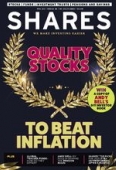Archived article
Please note that tax, investment, pension and ISA rules can change and the information and any views contained in this article may now be inaccurate.
Global tracker funds: how do they differ?

I’ve been looking at ETFs as a cheap way of getting exposure to lots of global stocks but I’ve seen different products with different names, including ones which seem to track the FTSE All-World index and MSCI World index. Is there any difference between the two?
Sara
You’re off to a good start, as one of the lowest cost ways to get started with investing in stock markets is through exchange-traded funds, and a popular way to get diversified exposure is through a global ETF, a type of tracker fund.

Before picking any ETF that has ‘world’ or ‘global’ in the name, there are a few things to consider, most notably which basket of stocks it tracks.
Two of the main indices used are the MSCI World and FTSE All-World. Others which are employed include global indices from Morningstar, S&P and Solactive, but the MSCI and FTSE ones are far more commonly tracked by ETFs.
Both have similar top 10 constituents featuring US giants Apple, Alphabet, Amazon, Facebook, Microsoft and Tesla but there are important differences between the two, which mostly stem from the fact the FTSE All-World includes emerging market companies alongside those in developed markets while the MSCI World is exclusively tracking developed market equities.
This has implications for their US exposure, for example. Around 66.5% of the MSCI index is made up of US stocks compared to 56.6% for the FTSE index. The latter also has the world’s largest semiconductor company, Taiwan Semiconductor, in its top 10 while the MSCI index does not.
Generally speaking, the FTSE index also has more exposure to Asia, with a 12.3% weighting to stocks in China, Hong Kong and Japan, making it a more diversified option.
As the chart shows this has resulted in subtly but still noticeably different performance over the past decade.
When picking an ETF, another issue to consider is cost. ETFs are one of the lowest cost ways generally to put your money to work in the stock market, and keeping costs down is important in boosting your investment returns.
The global ETF with the lowest charge is Amundi Prime Global (PRIW), which costs just 0.05% a year and follows the Solactive Global Developed Markets Large and Mid Cap USD Index, but its relatively lower level of assets under management at $365 million means the cost between buying and selling, called the bid/offer spread, could be higher and materially increase the total cost of trading the product.
More popular options tracking the MSCI World include Lyxor Core MSCI World (LCWL) which costs 0.12% a year and has $1.1 billion in assets, and iShares Core MSCI World (SWDA), which costs 0.2% a year and has $40 billion in assets.
Vanguard FTSE All-World (VWRL) tracks the FTSE index and has an ongoing charge of 0.22% as well as assets of $8.7 billion.
Important information:
These articles are provided by Shares magazine which is published by AJ Bell Media, a part of AJ Bell. Shares is not written by AJ Bell.
Shares is provided for your general information and use and is not a personal recommendation to invest. It is not intended to be relied upon by you in making or not making any investment decisions. The investments referred to in these articles will not be suitable for all investors. If in doubt please seek appropriate independent financial advice.
Investors acting on the information in these articles do so at their own risk and AJ Bell Media and its staff do not accept liability for losses suffered by investors as a result of their investment decisions.
Issue contents
Editor's View
Exchange-Traded Funds
Feature
Great Ideas
- The car retailer whose shares are up 93% since we said to buy last May
- GlaxoSmithKline unveils ambitious growth targets
- Why we’re sticking with Burberry despite Gobbetti goodbye
- Ideal time to add inflation protection with this cheap trust
- Buy i3 Energy to play oil price strength and imminent dividends

 magazine
magazine








